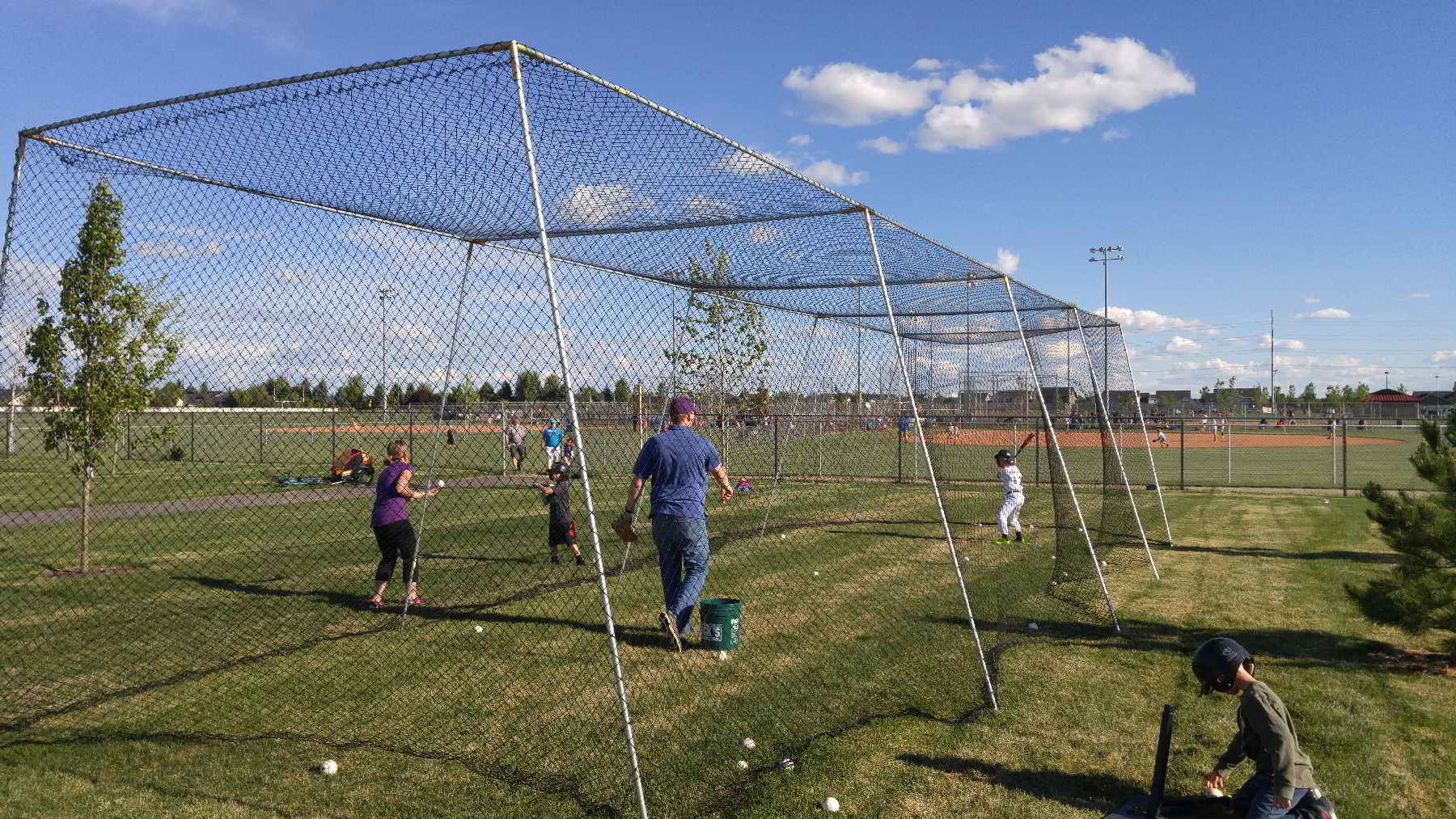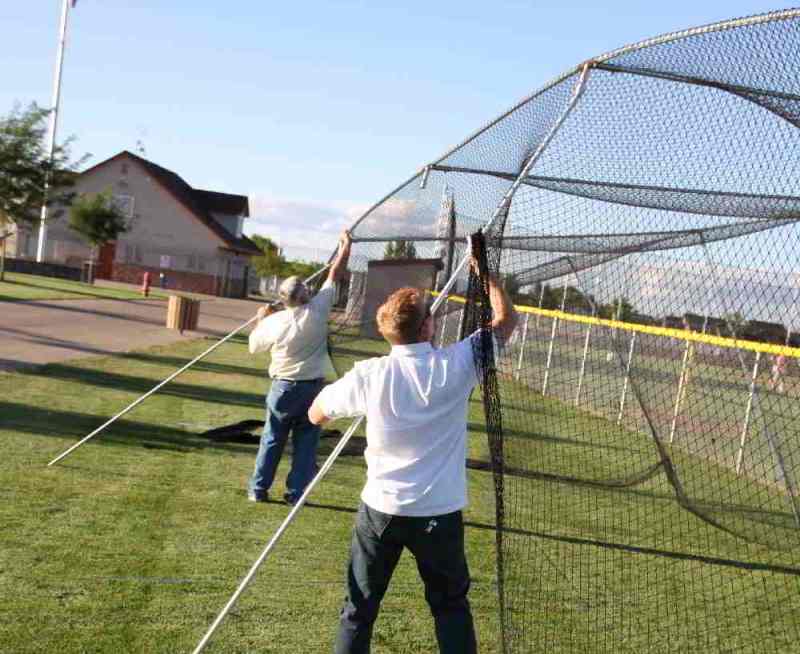
Tips on buying a batting cage (revisited)
Sorry I got carried away with this post...
Type of netting.
Netting is absolutely the most important part of your cage. It is the most expensive and you want to make sure you have a good quality and durable net. A good net will last between 6-8 years, some even longer. I have had reports of ours lasting 10-13 years, even I was surprised. Nets do wear out and they fade over time. We only use knotted nylon and do not use poly net. This is a personal preference. The very first net I made was from poly. I did not like the way it hung and it curled on the bottom. I did not know anything about netting 20 years ago and I have learned a lot since then. Poly or HDPE is weaker than knotted nylon by anywhere from 40-50%. It is also a lot cheaper than knotted nylon. So you will spend more when you buy a nylon product. But I believe it will last for years. Some have suggested that nylon will rot or deteriorate, but I have never experienced that in the 20 years we've been making cages. It will fade over time. Nylon is white and it has to be treated. In most cases there are two treatments, UV and water repellent. I'm told that when you do treat the net, it weakens it somewhat. If so, we have not experienced much degradation. Our nets are plenty strong for backyard use. We recommend the #21 for backyard use, which is our regular net. We do have a heavy duty, #36, but I think that is more for a high school or college team as they will beat on it every day, all day. Netting manufacturers sell netting by the pound. So the #36, which weighs almost twice per square foot as the #21, is quite a bit more expensive than the #21.
Netting strength
Beware of the numbering on the twine. Some cage manufacturers offer a similar number, but the breaking strength is different. It is wise to ask or look for the breaking strength of the net. The numbering of twine is not consistent. Netting is rated by what is called denier. The denier, a traditional textile unit, describes the density of yarn. A 9-km strand of yarn that weighs exactly a gram has a density of one denier. The problem of course is there is not a standard. Some poly net has a denier rating, but the strength of the poly is different than the strength of the nylon. A 600D (600 denier) poly in a lot of cases is not as strong as a 420D nylon. So it is good to look for breaking strength or burst strength. Now no one ever hits a single strand with a baseball or softball, so when you find the burst strength multiply by four, since a ball will hit at least four strands or a mesh. Out #21 nylon is rated at about 209 pounds per strand burst strength, so about 836 pounds per mesh. While the #36 has a burst strength of about 380 pounds per strand or 1520 pounds per mesh. So the #36 is almost twice as strong as the #21.
Diamond versus square
Personally I prefer the diamond shape netting rather than the square. There is waste when you make netting on the square. You do however, get exact measurements. For example, if you buy a 12'T by 10'W by 40' long net on the square, your net will be exactly, or pretty close, to those measurements. It is because there is very little give when netting is on the square. However, when it is made, all machines make it on the diamond. So to make it on the square, cutting and re-sewing on the diagonal is necessary. Now it is my opinion, that on the square netting does not give that much. The design of our cages is for the net to give. It is not attached anywhere to the frame and can give upon impact. Thus there is a lot less war and tear on the net. I believe that is one reason it lasts so long. A lot less stress on the net. A net on the diamond will stretch and its measurements are not exact. So for example, our 40' cage can actually be around 42'. It can stretch quite a bit and the diamonds can stretch. However, when you stretch the diamond shape net it also narrows. You'd like the diamonds to be "squares on their side", if that makes sense.
Door versus no door
I'm not sure why people ask about a door into the batting cage. This wastes product and can even cause falls. I've seen pictures of batting cages with doors and there is net on the ground that people trip over trying to get in and out of the cage. Our cage has no door. Just lift up the net and walk under. It is like an upside down shoe box without the lid. No openings or gaps for balls to escape. No netting to trip over.
3/4" EMT versus Top Rail or 1 3/8" pipe
I get this question/comment a lot. They say the 3/4" EMT looks flimsy. I say, don't confuse flexible with flimsy. Our poles are on the inside of the cage, so you don't want a ricochet problem. With 3/4" EMT it is strong enough to hold everything up. You can't do chin-ups or climb up the poles, but they are strong enough to hold everything up. Plus it keeps the net away from you and does not hang straight down. So it is quite roomy inside our cage. Top rail and heavy pipe is expensive. So the frame is much more expensive. Our 40' cage requires 23 poles. The price of the 3/4" EMT at Lowe's at the time of this writing is about $3.70 and the 1 3/8" top rail is around $12. so the 3/4" frame runs about $85, while the top rail frame runs around $276. The 3/4" EMT is lighter than the 1 3/8" top rail. So the frame is lighter too. So one weakness of our system is wind. Our cage is free standing. Even though there is a lot of "holes" in the net, there is also a lot of surface area and cross winds can actually tip over the cage. Most folks put it alongside the house, or tree line or fence line. In which case, wind is generally not an issue. But if you have to have it in the wide open space you may need to anchor down the cage with rope or stakes of some kind.
L-screen
We include an L-screen with our cages. This is for safety. It would be cheaper to exclude it, but we believe it better to be safe than cheap. Just getting hit once in the chest with a batted ball will make you a believer too!
Cost
Prices of batting cages are all over the map now. In the old days they were very expensive and almost all of them were permanent. You had to dig holes, pour concrete etc. A lot of folks have copied our idea and tried to make the less expensive and more affordable for the family. Some are too cheap to even consider. I've seen some for $300-400. I wouldn't spend much time considering these. Rarely do they last an entire season. Some of these have fiberglass poles and they break in the wind or when hit by a batted ball. They just don't last and the netting is pretty weak. I've seen them offer a #12 or #15. While ours aren't the cheapest anymore, they are of very good quality and we provide excellent customer service and support. We answer the phones and ship out promptly. You get what you pay for. Some are very expensive, partly due to the frame cost, partly due to the netting they try to sell you. A lot of cage companies try to sell you a #42 or even a #96. You just don't need that heavy a net for backyard family use. For a decent cage you can probably consider spending in the neighborhood of $800-$1000 and up. The longer the cage the more the money. The heavier the net the more the money. Our #36 70' cage with L-screen runs $1369, the frame poles would add $140 to the price for a total of about $1510, that is ready to start hitting. Nothing extra to buy. At the low end our #21 40' cage is $699 and the frame would add $85 for a total of around $784. Our 50' cage is the most popular, while not regulation distance on the inside, you rarely need that for batting practice.
Recap
Ask a lot of questions: What type of netting do you use? What is its burst strength? How long do you guarantee it? What is the return policy? What do you include with it? An L-screen? A backdrop? What do I have to buy to get a complete batting cage? What are the weaknesses? What is my out-of-pocket cost? Don't rush or hurry with your decision. Take some time. This is an important investment. You want to get years of enjoyment out of this. Bookmark several websites and revisit them. Call up the company. Do they answer the phone? Do they respond to your emails? Do they know what they are talking about or is it just a sales person trying to make a sale. Is it a website the sells everything or do they specialize in a few things. Are they dealers or do they sell the product?





Leave a comment
All comments are moderated before being published.
This site is protected by hCaptcha and the hCaptcha Privacy Policy and Terms of Service apply.